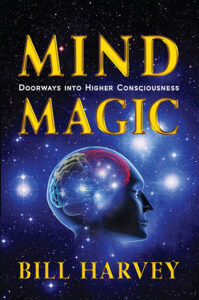Powerful Mind Part 36
Welcome to this week’s Bill Harvey Blog – November 7, 2025
Created November 10, 2023
Read Powerful Mind 35 | See all 12 Powerful Mind Keys

The latest findings of neuroscience suggest that we, as individual human beings, interpret our own emotions as they happen. The physical signals we receive may suggest not only the degree to which our emotions are aroused, but they may even suggest the valence as either being positive or negative emotion, but then there is a cognitive interpretation layer we impose to further characterize to ourselves the emotions we are feeling.
In my own introspections, I had also come to that same conclusion long ago, that my mind had the ability to clarify the emotions I was experiencing. In some cases, I felt overwhelming arousal and initially took that to be fear and panic, but then, applying Observer state (metacognition) I was able to refine that classification into positive excitement and anticipation rather than negative fear. This was the way I learned to deal with stage fright when my showbiz parents put me on stage at age four.
The general reason why it is important to be able to bring emotional self-interpretation into play is to avoid making things worse.
There is a proven feedback loop between our expectations and the results we get. If we fear failure, it increases our probability of failure.
This goes beyond psychology. In physics, the greatest theorists, including Einstein, Wheeler, and Hawking, have postulated what Wheeler called the Anthropic Participatory Principle, the ability of consciousness to collapse probability waves into concrete objects. Einstein did not go quite as far, but could not describe relativity without including an observer (consciousness) in his equations.
Knowing that our inner emotional content has significant impact on the outcomes in our lives, and that we have the interpretation layer at our disposal in order to clarify exactly which emotions we are feeling, we face the choice of either:
A. Continuing to relinquish control over how we interpret our emotions, leaving that up to our brain’s default network to settle that as it will, and accepting the consequences.
B. Exercising our willpower to focus our minds on self-observation and clarifying our emotions based on the pragmatic principle that outcomes will be better to the degree that we classify our emotions more positively.
The ideal mental framework if we choose the “B” option is (1) gratitude for being alive and for the life we have been given, despite perceived imperfections, (2) resolute confidence that we shall attain our dreams someday, so long as we stay positive toward ourself and toward everyone else.
That’s the gratitude attitude that gives you the greatest chance of success at whatever you do. The word “someday” implies that we ought not be impatient or overly attached to the experience of success, but instead should enjoy the passage of time, the journey rather than the destination. This total package of attitudinal viewpoints is the master cocktail for maximizing success.
The implication is that in any given moment, if you sense your own emotions, the interpretation of those emotions should be the priority. If you are also besieged by your own tumble of thoughts and questions in your mind about various subjects, you might write down the fewest possible trigger words which will serve to remind you of those questions so that you can tackle them later on.
When I was very young, I took a very different path. I greatly esteemed thinking over feeling, for a very long time, and so I paid priority attention to my thoughts and questions of an intellectual and rational nature. I considered my emotions more as animal instincts to be conquered than as valuable signals. I was in my late teens by the time I realized that many of my intellectual questions were reduced to aesthetic preferences, i.e., feelings.
My undervaluing of feelings led me to take on a general preference for melancholy in the form of “glamorous cynicism”. I actually felt most comfortable being in a negative mood. Later on, this became a hard-to-break habit, but one which I eventually overcame. I had to see the way the negative mindset had ruined a number of great opportunities before I could wake up to, and bring in, the feeling side of the game to my self-recommended life systems (“psychotechnology”).
As we begin the description of Key #10 here, we are entering into the complexities of what goes on in the mind, from the subjective viewpoint of you, the experiencer. In this environment, every instant is besieged by qualia (subjective inner phenomena), some of which purport to describe the “outside” world (perceptions) and some of which report signals from the “inner” world (thinking, feelings, intuition, memories, imaginings, images). Operating according to the current norm for homo sapiens on Earth, all of this washes over you and what you pay attention to and do about it all, seems to do itself without much help from you, even when some of it is stuff that you do consciously but automatically, like saying thank you. But some of it riles you up and you over-react negatively, and some of it peps you up and you possibly over-react positively… all of it feeling fairly out of control, but you’re used to it, so it doesn’t induce panic most of the time.
Key #10 is completing the granular dissection of Observer state so that you are more fully prepared to deal with life with a far greater degree of conscious control.
We started with the feelings because they are the most powerful and least controllable qualia we experience. Remember the Gratitude Attitude in order to not be overtaken by your feelings, but to leverage your feelings so that you may channel their energies in the directions of your ultimate dreams.
Best to all,
![]()





 “When you are about to see something, your mind automatically searches your memory for a comparable object (note the distinction between you seeing something and your mind having already seen it). If your mind finds something similar enough, it projects the stored image onto the new object so that you do not ever see the new object, but are merely dimly aware that there is a familiar type of object there… As a result of this, you mostly do not perceive your environment, instead perceiving mostly what you expect to perceive, i.e. you usually see your mind’s prediction.”
“When you are about to see something, your mind automatically searches your memory for a comparable object (note the distinction between you seeing something and your mind having already seen it). If your mind finds something similar enough, it projects the stored image onto the new object so that you do not ever see the new object, but are merely dimly aware that there is a familiar type of object there… As a result of this, you mostly do not perceive your environment, instead perceiving mostly what you expect to perceive, i.e. you usually see your mind’s prediction.”